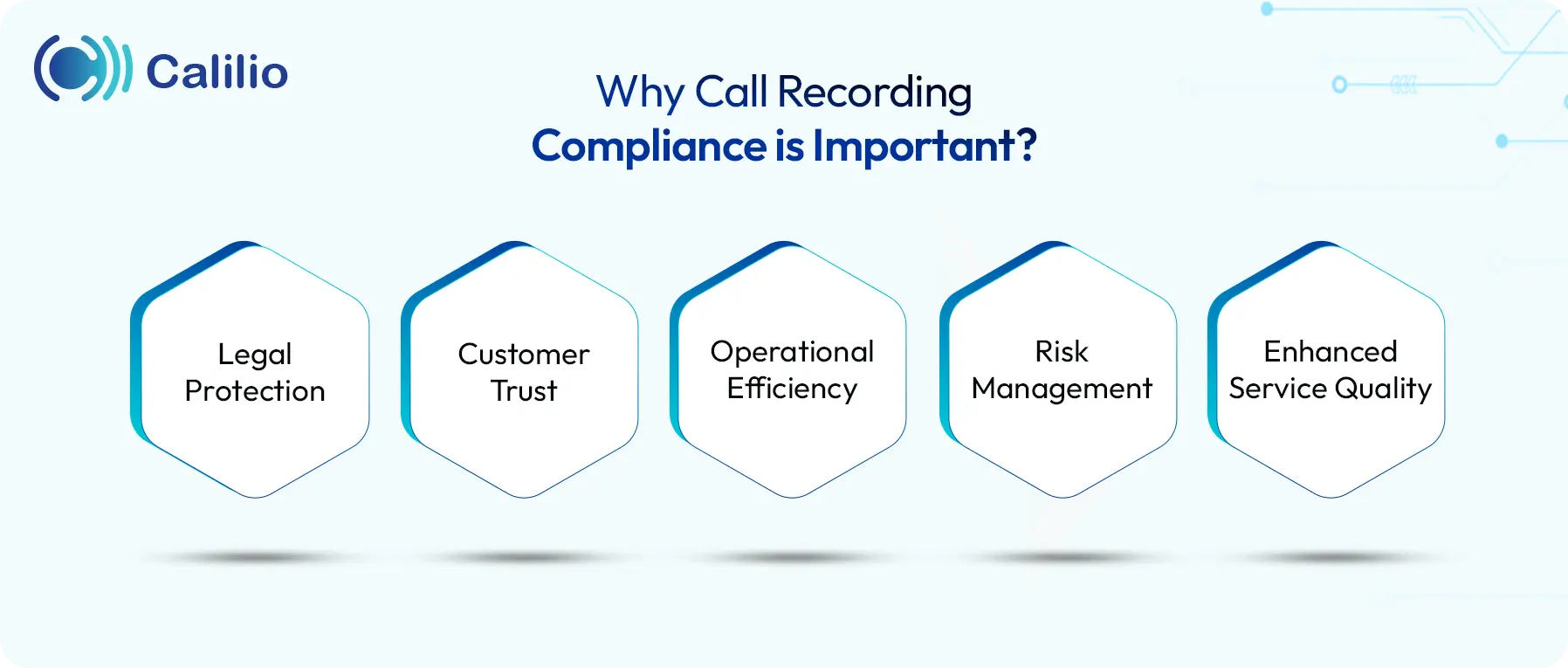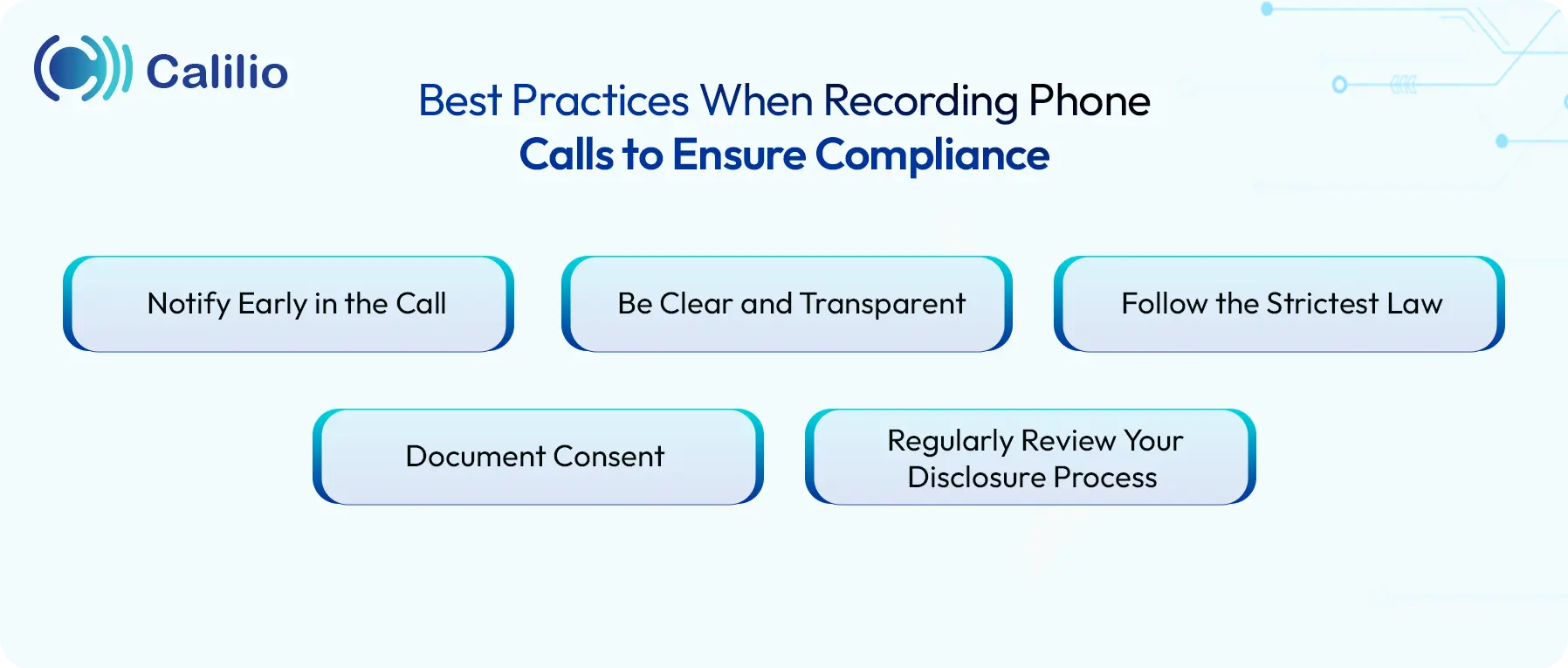Call Recording Compliance: Country Laws & Best Practices

Call recording has become an essential tool for businesses to improve customer service, train employees, and maintain accurate records of conversations. However, recording calls isn’t as simple as hitting a button. It’s governed by strict legal and privacy regulations that businesses must follow to stay compliant.
Failing to follow call recording compliance laws can result in costly fines, lawsuits, and damage to your company’s reputation. That’s why understanding these regulations is critical, especially when operating across different states or countries where the laws can vary significantly.
In this article, we’ll explain what call recording compliance means, why it matters, and the key regulations in major regions like the US, EU, UK, Canada, and Australia. We’ll also cover the best practices businesses should follow to stay legally compliant while recording calls.
Key Highlights:
Call recording compliance helps to avoid legal risks, fines, and damage to business reputation.
Compliance involves obtaining proper consent, informing participants, securing recorded data, and adhering to evolving regional laws.
Different countries/regions, such as, US, EU, UK, Canada, and Australia, have specific call recording laws around consent and disclosure.
Businesses must regularly audit their practices, stay updated on regulatory changes, and implement secure storage solutions for recorded data.
What is Call Recording Compliance?
Call recording compliance refers to the legal requirements businesses must follow when recording phone calls. These laws ensure that businesses are transparent with their customers about the recording process and handle the data responsibly.
The main goal of call recording regulatory compliance is to protect consumer privacy while also allowing businesses to record calls for legitimate purposes, such as quality assurance, training, or record-keeping. Non-compliance can lead to serious consequences, including fines and penalties.
Why Call Recording Compliance is Important?
Call recording compliance is vital for legal protection, maintaining customer trust, and improving operational efficiency. It helps businesses avoid legal penalties, provides valuable documentation for dispute resolutions, and supports service quality improvements.

- Legal Protection: Complying with call recording laws keeps your business safe from fines, lawsuits, and other legal consequences.
- Customer Trust: Call recording compliance ensures transparency and improves trust. When customers know their privacy is respected, they feel more confident interacting with your business.
- Operational Efficiency: With clear recording and storage procedures, businesses can streamline call-handling processes. Efficient call management makes it easier to access important conversations for training, customer support, or quality control.
- Risk Management: Compliant call recordings provide valuable documentation. When disputes arise, having a properly recorded call can serve as evidence, reducing the risk of misunderstandings and legal complications.
- Enhanced Service Quality: With a better call recording policy, businesses can analyze recorded calls easily to identify areas for improvement. This leads to better agent training, improved customer service, and faster resolution of customer issues.
Key Call Recording Laws by Region
Call recording laws may differ from one region to another, even within the same country. In the US, most states allow one-party consent, but some states require all-party consent. In the EU and Germany, you must get clear permission before recording, often from everyone involved. Likewise, the UK allows individuals to record calls for personal use without consent, but businesses need a legal reason.
United States
In the US, call recording laws vary by state, with federal regulations permitting one-party consent. However, some states impose stricter all-party consent laws that override federal law.
- One-party Consent: In most states, only one participant (the person recording the call) needs to give consent. This means a call can be recorded without informing the other party.
- All-party Consent: Thirteen states require all participants on the call to agree before recording. These states are often referred to as "two-party consent" states. States that follow this rule include: California, Connecticut, Delaware, Florida, Illinois, Maryland, Massachusetts, Michigan, Montana, Nevada, New Hampshire, Pennsylvania, and Washington.
- Interstate Calls: For calls between people in different states, the laws of all involved states apply. To stay compliant, it is best to get consent from everyone on the call.
European Union (EU)
In the EU, the General Data Protection Regulation (GDPR) governs call recording, which requires a clear, legal basis for processing personal data. You must obtain clear consent to record the calls. Simply continuing a call after a disclaimer is typically not sufficient.
- Consent: Consent must be freely given, specific, informed, and unambiguous. Businesses must explain who is recording the call, why it’s being recorded, how long the data will be kept, and how consent can be withdrawn.
- Legitimate Interest: Businesses can record calls for legitimate interests, such as quality assurance or staff training. However, this must be carefully balanced against the caller’s right to privacy and data protection.
United Kingdom (UK)
Since Brexit, the UK follows its own data protection regulations under the UK GDPR and the Regulation of Investigatory Powers Act 2000 (RIPA).
- Personal Use: Individuals can record calls for personal use without consent. However, sharing these recordings with third parties is illegal.
- Business Use: For businesses, recording requires a legal basis, such as obtaining consent or demonstrating a legitimate interest. Businesses are also required to register with the Information Commissioner's Office (ICO) to be eligible to record calls.
Canada
In Canada, the Criminal Code permits one-party consent for recording personal conversations, but businesses must comply with additional privacy regulations for business purposes.
- Federal Law: Allows one-party consent for private conversations.
- PIPEDA (Personal Information Protection and Electronic Documents Act): For businesses, all-party consent is required. Businesses must:
- Inform all parties at the start of the call that the conversation will be recorded.
- Clearly state the purpose of the recording.
- Offer an alternative for customers who do not want to be recorded.
Australia
Australia’s call recording laws differ by state and territory, with no single federal law governing all private conversations.
- All-party Consent: Most states and territories require consent from all parties for recording private conversations. Exceptions exist for specific circumstances, such as recording in the public interest or to protect legal interests.
- One-party Consent: In some areas, like Queensland, Victoria, and the Northern Territory, one party can record a conversation without the consent of others under certain conditions.
- Workplace Recordings: Secretly recording conversations in the workplace is generally considered misconduct and can lead to serious consequences.
*Disclaimer: The above information is for informational purposes only and should not be considered as legal advice. Laws vary by jurisdiction and can change over time. Always consult a legal professional to ensure your business remains compliant.
Best Practices When Recording Phone Calls to Ensure Compliance
To ensure compliance, always notify all participants that the call is being recorded and explain the purpose of the recording and how the data will be used. When making calls across regions, follow the strictest laws. Also, document consent for legal protection and regularly review and update your disclosure practices to stay compliant.

Notify Early in the Call
Always inform the other party at the beginning of the conversation that the call will be recorded. This can be done with:
- Verbal Notifications: A simple statement like, “This call is being recorded for quality assurance purposes.”
- Automated Messages: A pre-recorded message that plays at the start of the call.
- Audible Beep Tones: In some jurisdictions, using a periodic beep tone during the call serves as a notification.
Be Clear and Transparent
Make sure the disclosure is clear and easy to understand. Avoid legal jargon or overly complex language. The message should explain the purpose of the recording and reassure the participant about how their data will be used and protected.
Follow the Strictest Law
When calling across different regions with different laws, such as interstate or international calls, it’s safest to follow the strictest applicable law. This usually means obtaining consent from all parties. This approach ensures full legal compliance and reduces the risk of violations.
Document Consent
Always record and store consent whenever possible. This is especially important for businesses operating in regions that follow TCPA regulations. Having a documented record of consent can protect your business in case of legal challenges.
Regularly Review Your Disclosure Process
Laws and regulations evolve, so it’s important to regularly review and update your call recording disclosure practices. Also, ensure that your employees are always trained on any changes.
Common Challenges of Call Recording Compliance
Call recording compliance is challenging due to varying laws across regions, employee adherence, data security needs, and managing multiple communication channels. Similarly, keeping up with evolving regulations also adds complexity to maintaining compliance.
Complex and Varying Regulations
Employee Compliance
Maintaining employee compliance with call recording policies requires ongoing monitoring and regular training. Despite initial instruction, employees may occasionally fail to follow proper procedures due to a lack of awareness or a misunderstanding of regional legal requirements, especially during busy hours.
Securing Recorded Data
Businesses must protect critical call data for compliance with privacy regulations. They must ensure recordings are securely stored, encrypted, and accessible only to authorized personnel. Failure to implement strong data security measures can lead to breaches, legal penalties, and loss of customer trust.
Managing Multiple Communication Channels
Nowadays, businesses communicate through multiple channels, and some may involve recording conversations. Each channel may have different compliance requirements, making it harder to maintain uniform practices across all communication methods.
Keeping Up with Legal Changes
Regulations surrounding call recording compliance are constantly evolving. Laws can frequently change at the federal, state, and international levels, requiring businesses to stay updated and adapt their processes to remain compliant.
Conclusion
Call recording compliance is essential for businesses that want to protect themselves legally, build customer trust, and maintain smooth operations. Failure to comply with these regulations can result in heavy fines, lawsuits, and loss of customer trust.
By obtaining consent, informing participants, securely storing data, and staying updated on regional laws, businesses can ensure they meet compliance standards and avoid costly legal consequences.
Summarize this blog with:
Frequently Asked Questions
What is the difference between one-party consent and all-party consent?
One-party consent means that only one person in the conversation needs to be aware of and consent to the recording. On the other hand, all-party consent requires that every person involved in the conversation must be informed and agree to the recording.
How often should businesses audit their call recording compliance practices?
Do businesses need to notify customers about call recording?
How can businesses ensure secure storage of recorded calls?

Still have questions?
Can’t find the answer you’re looking for? Please chat with our friendly team.
Stay in the loop
Get the latest call insights, trends, and updates delivered straight to your inbox.
By subscribing, you agree to receive updates from Calilio.
You can unsubscribe anytime.
